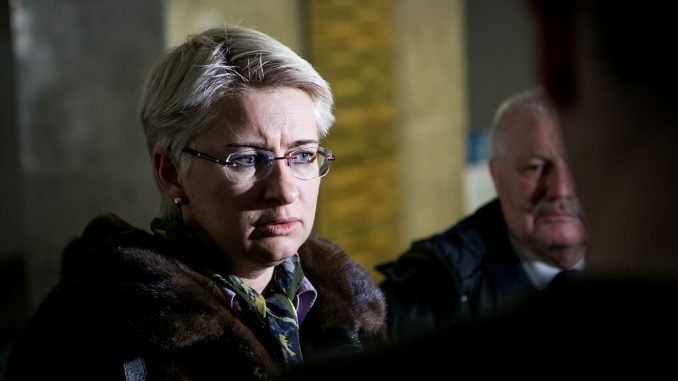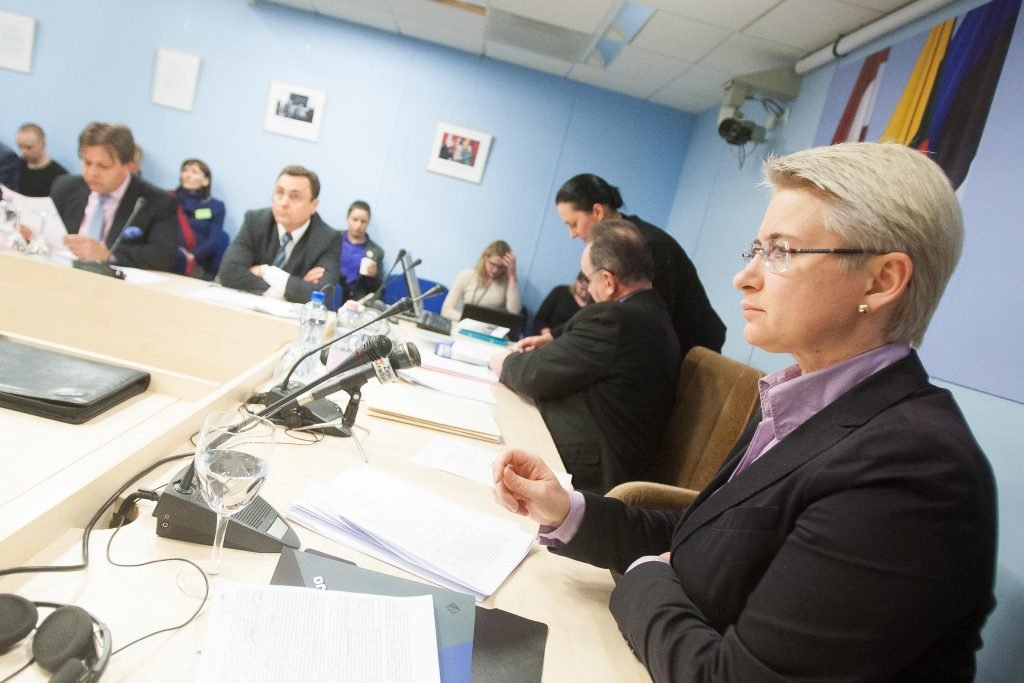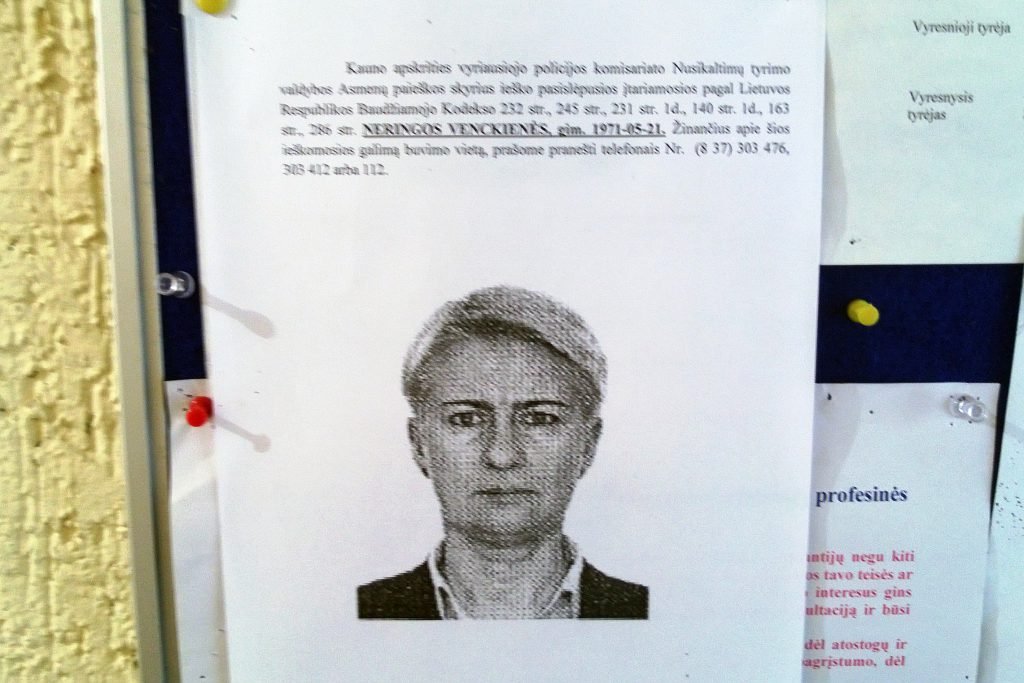
Recent news about a former judge Neringa Venckienė extradition to Lithuania have forced many to recall the now infamous alleged paedophilia case of Garliava, near Kaunas. Back in 2009, N. Venckienė took part in exposing a cover-up of an alleged paedophile ring involving high-ranking government officials in Lithuania.
With at least two people murdered and two dead in mysterious circumstances, this scandal has been dividing Lithuania for over a decade. As Lithuania braces for the return of the jailed ex-judge Neringa Venckienė, the Lithuania Tribune traces the origin of the so-called Garliava paedophilia scandal, providing an overview of the most important developments during this ten-year-long controversy.
From custody battle to the paedophilia scandal
What began as a custody battle between Venckienė’s brother Drąsius Kedys and his former girlfriend Laimutė Stankūnaitė over their daughter Deimantė Kedytė, soon exploded into a full-blown paedophilia scandal that shook Lithuania to its core.
In 2008, Kedys filed a legal complaint to the police, claiming that politician Andrius Ūsas had sexually abused his then 4-year-old daughter in exchange for money, which then went to the girl’s mother Stankūnaitė. On this basis, Kedys obtained full custody of his daughter. However, courts later dismissed his allegations against his former girlfriend as unsubstantiated. Despite the court ruling, the pre-trial investigations against politician Ūsas continued, only to find him innocent approximately a year later, after his mysterious death.
Throughout 2009, Kedys further pressed accusations against Violeta Naruševičienė, sister of Stankūnaitė, for partaking in the alleged paedophilia ring and trading his daughter for sex and cash. In July 2009, Kedys also levelled serious accusations against district judge Jonas Furmanavičius, a colleague of judge Venckienė, and an unidentified individual named Aidas of participating in the molestation of his daughter. All those involved denied the allegations and accused Kedys of slander and criminal libel.
Sexual abuse testimony on tape
Faced with a lack of response from the authorities, Kedys took the matters into his own hands by sending out over 200 DVDs containing his daughter’s testimony of the alleged sexual abuse by ‘three uncles’. Kedys sent DVDs subtitled in English to several members of the Seimas, Lithuanian MEPs, mass media, Ministry of Justice as well as foreign embassies.
Under the prosecutors’ decision, the girl was then questioned by psychologists and later underwent thorough psychiatric and psychological examinations. While psychiatric evaluations found it unlikely that the girl had lied or was inclined to fantasize, some sceptics believed that Kedys had coached the girl beforehand. After no physical injuries on the girl were found, the prosecutors later dropped the case due to lack of proof. However, the girl’s father as well as her aunt Neringa Venckienė kept on fighting.
First victims
Shortly after controversial allegations of child sexual abuse reverberated across Lithuania, mysterious deaths ensued.
On Oct. 5, 2009, district judge Jonas Furmanavičius and Violeta Naruševičienė were shot both in Kaunas. Judge Furmanavičius was fatally injured when getting out of his car in a simulated car accident. After examinations, four gunshots were found in his body. A couple of hours later, Naruševičienė was shot nearby her house and later discovered by her 8-year-old daughter upon return home from school.
Initial suspicions fell on Drąsius Kedys, who disappeared shortly after the killings. After his disappearance, judge Neringa Venckienė assumed custody of her niece.
Police investigations later confirmed that shots at judge Furmanavičius were fired from a white VW Transporter van, which belonged to the company where Kedys worked at the time. Moreover, during an investigation of Naruševičienė’s home, police found a Beretta pistol next to the woman’s body. According to reports, the pistol was registered under Drąsius Kedys’ name.
After further investigations, prosecutors determined that Drąsius Kedys committed both killings.
Drąsius Kedys found dead
On Oct. 6, 2009, the Prosecutor General’s Office launched an official search of main suspect Drąsius Kedys on charges of double homicide.
Six months later in April 2010, Kedys’ body was found in mysterious circumstances nearby Kaunas reservoir. While investigators blamed his death on alcohol intoxication, many critics claimed that Kedys was severely beaten and died a violent death.
Similarly, judge Neringa Venckienė, claimed that her brother was murdered due to his attempts to expose the cover-up of the alleged paedophilia ring run by high-ranking government officials. Besides, they both claimed that these officials sexually abused Kedys’ 4-year-old daughter with the help of the girl’s mother Stankūnaitė.
After Kedys’ death polarised Lithuania, some proclaimed Kedys a vigilante hero, fighting against Lithuania’s corrupt judicial system, with his sister Venckienė at the forefront of the movement. Others, however, claimed that Kedys and Venckienė fabricated the allegations of child sexual abuse to use as leverage in the custody dispute with Stankūnaitė.
Death toll rises
In mid-June 2010, the body of politician Ūsas was found in a shallow pool of water nearby a quad bike in Alytus. Investigators ruled the accident a drowning, but some sceptics disagreed, claiming that the politician was murdered.
At the time, Ūsas was considered the sole suspect in the alleged paedophilia case. However, he was later found innocent in court. Until his last days, Ūsas vehemently denied all allegations of sexually abusing the girl and was suing Drąsius Kedys for slander.
Soon after that, the 24-year-old Vaidas Milinis, son of Albertas Milinis, the chairman of the Lithuanian Association of Judges and Kaunas Region Court, was found dead in his car in Kaunas area. After initial examinations, investigators concluded that he had been tortured and then shot to the head. After her son’s death, Milinis’ mother said he was killed because Kedys’ fans had given him the nickname of the ‘third paedophile Aidas’. To date, the murder of Milinis has not been solved.
Custody fight over girl mobilises masses
After the death of her brother, judge Neringa Venckienė obtained temporary custody of her niece. However, in early 2012 under the court’s final ruling, Venckienė was ordered to return the girl to her mother Stankūnaitė. Deemed unjust by many, the court order sparked public anger and mobilised hundreds across the country in support of Venckienė.

As legal pressure on judge Venckienė grew, supporters surrounded her house in Garliava, thus hindering officials’ attempts to remove and reunite the girl with her mother. However, on 17 May 2012 riot police finally broke through the wall of protesters, physically seizing the girl and returning her to Stankūnaitė. This police action was broadcasted live on national TV channels. While Venckienė described the encounter as violent, claiming to have suffered physical injuries, she was later accused of hitting an officer in the face.
That day, 39 protesters were detained, with hundreds of others later gathering outside President Grybauskaitė’s residence in Vilnius to demonstrate against the enforced court order.
During the long months that engulfed two women in a bitter custody battle, district judge Venckienė had more than once publicly expressed her disappointment with the ‘rotten’ judicial system in Lithuania for whitewashing a ‘clan of paedophiles’. Her remarks were oftentimes censored, and she was given notice for violating the Judge Code of Ethics due to her defamatory statements.
Political party Drąsos Kelias (the Way of Courage)
From here onward, Lithuania witnessed the establishment of the political party the Way of Courage in 2012, which served as a political extension of judge Venckienė’s ongoing fight against ‘the system’.
Together with other supporters, Venckienė ran on an anti-corruption platform aimed at combatting ‘clans of bankers and oligarchs, corrupt officials and paedophile groupings’ that allegedly engulfed Lithuania. Throughout her time in the Parliament, Venckienė sought to bring reforms to the justice system, enforce stricter punishments for corruption, rape and paedophilia as well as wanted more government transparency.
Scandal rivets Lithuanians
Back in the day, judge Neringa Venckienė became one of the most influential media figures and a rather famous politician in the country. After gaining a massive wave of public support, she was elected to Parliament and became the chairwoman of her party’s faction in October 2012. That year, Drąsos Kelias (The Way of Courage) gained approximately 8% of the popular vote and won 7 seats in the Parliament. This result, however, was a definite disappointment for the new political party.
While Neringa Venckienė enjoyed support from a large part of the populace as well as some prominent politicians in Lithuania, she also faced a backlash from others in power, with efforts to revoke her legal immunity and get her impeached.
Critics of Venckienė the Way of Courage a party of ‘kedophiles’, claiming that she has exploited her niece to drive her populist political campaign as well as fuel populist media in the country with forged claims about the alleged paedophilia network in Lithuania.
Later that year, Lithuanian Prosecutor General asked Parliament to revoke legal immunity of MP Neringa Venckienė. With the majority’s support, Venckienė’s was stripped of her legal immunity in April 2013, disappearing immediately after with her teenage son, Karolis Venckus.
Flees to the United States
After her legal immunity was revoked, the now ex-lawmaker and judge Neringa Venckienė fled to the United States in 2013, seeking political asylum with her then-teenage son Karolis Venckus. Having obtained legal documents allowing her to live and work in the U.S., Venckienė eventually settled in Chicago suburb of Crystal Lake together with her son. There, she worked as a nursing home aide, to later become a florist.

While Lithuania issued an arrest warrant in 2015, Venckienė was only arrested in the U.S. three years later in February 2018 and has been detained in Chicago’s federal prison ever since.
Extradition of former judge N. Venckienė
The appeal of former MP and judge Neringa Venckienė to halt her extradition to Lithuania had been recently rejected by the Chicago-based U.S. Court of Appeals, leaving no obstacles for her to be returned to Lithuania.
While Venckienė’s lawyers could call for the Supreme Court’s intervention, it is highly unlikely that her case will be taken on after the decision of the U.S. Court of Appeals has deemed it a closed call.
The charges that Venckienė faces in Lithuania include failure to comply with a court order to relinquish custody of her then 4-year-old niece, molesting the child, hitting a police officer, reporting a false crime, illicitly collecting information, among others. Some of these charges have been rejected and dropped by the U.S. court.
Attempts to halt extradition
Former judge and MP Neringa Venckienė claim that charges brought against her are politically motivated and that she fears death if sent back to Lithuania. In an attempt to prove her case, Venckienė claims that the anti-paedophilia movement she led in Lithuania should be considered an uprising, which would count as legitimate basis to halt the extradition process. As a result, Venckienė hoped that charges against her would be established as politically driven by the U.S. Department of State.
However, Venckienė’s claims about the uprising were dismissed as unsubstantiated. The court ruling claimed that it is the duty of the U.S. court to comply with the terms of the extradition treaty between the U.S. and Lithuania, which is also a fully-pledged member of NATO and the European Union. The ruling also argued that it is not up to the U.S. court to decide whether former judge Neringa Venckienė was guilty or innocent.
‘Venckienė will still have an opportunity to challenge the charges against her,’ the ruling said. ‘That opportunity must come in the Lithuanian justice system,’ it further argued.
Cry for help
Following the court ruling, Venckienė’s son, Karolis Venckus, released a video in an attempt to draw worldwide attention to his mother’s story.
‘My family has been and continues to be to be the victim of severe political persecution,’ Venckus says in the video.
‘My mom has been fighting this fight for the last decade and I’ve been trying to help her out the best I could since she was detained. I testified before Congress, the Helsinki Commission and helped get bills introduced to stop the extradition, but they will most likely not pass in time to help my mom. She can be extradited at any moment. What we need now is your attention. We need the Lithuanian government to know that the whole world is watching, and we will judge them on how they treat my mom,’ Venckus further said.
Full video can be found here.

Be the first to comment